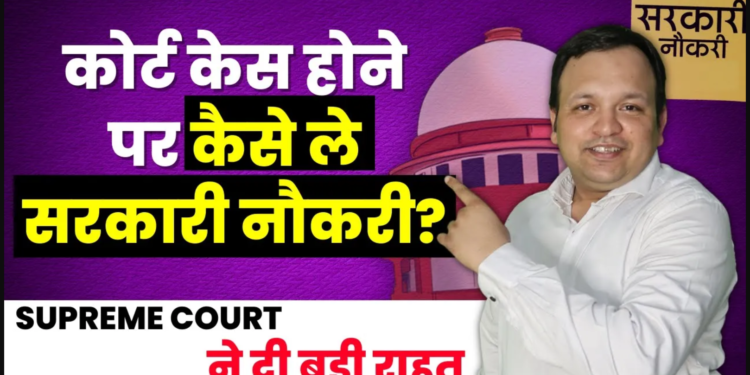Introduction
When it comes to legal matters, individuals often wonder about the consequences of having a criminal trial or being acquitted on their government job prospects. In this blog post, we will explore the implications of a criminal trial and subsequent acquittal on government employment, supported by relevant laws and recent Supreme Court judgments. By examining a notable case and its subsequent legal proceedings, we aim to shed light on this topic and provide valuable insights for individuals navigating similar situations.
Are you worried about not getting a Government job because of a past acquittal? Can the acquittal in any case affect your chances of getting a job in a government sector? Is having a history of charges a barrier to one’s job? What to do to apply for a job in the government sector when there’s a history of charges in your name? What kind of offenses are considered to be serious when applying for a job? What must one declare in the declaration form before applying for a government job? Should you lie about acquittal before joining a government job?
The answer to all your queries is summed up in this blog.
Keep reading till the end to get your answers, backed with a Landmark judgment; or if there are any additional queries, feel free to contact us through; https://thelegalshots.com/legal-opinion/
Pramod Singh Kirar vs. The State of Madhya Pradesh
Brief facts of the case:
To delve into the complexities surrounding criminal trials and government jobs, we’ll analyze the case of Pramod Singh Kirar vs. The State of Madhya Pradesh, which took place on December 2, 2022.
In this case, Pramod Singh faced a trial under Section 498A of the Indian Penal Code (IPC) which states punishment for a husband or his relatives for cruelty against his wife regarding dowry.
- The accusation stemmed from his wife filing an FIR against him, alleging harassment for dowry.
- However, a settlement was reached between the parties, leading to Pramod Singh’s acquittal.
In 2014, Pramod Singh applied for a position as a police constable. During the application process, he truthfully declared the previous criminal trial and subsequent acquittal in response to the standard verification form’s question regarding past criminal trials. However, to his dismay, when the state government announced the selected candidates for the constable position, Pramod Singh discovered that he was not among them.
In response to the job rejection, Pramod Singh approached the High Court, arguing that his rejection based solely on the past criminal trial, for which he was acquitted, was unjust. The High Court agreed with his plea and directed the state government to provide him with immediate employment. Dissatisfied with the High Court’s decision, the state government appealed to the Division Bench, stating that the decision to hire or reject a candidate with a criminal background, even if acquitted, falls within their discretion.
Final Judgement :
The case eventually reached the Supreme Court, where both parties presented their arguments.
Pramod Singh contended that:-
- The nature of his offense, Section 498A of the IPC, was a matrimonial offense and not a heinous crime against the public.
- Additionally, he emphasized that his acquittal and the subsequent settlement with his wife rendered the charges baseless.
- Furthermore, he pointed out that he had explicitly disclosed the criminal trial in his job application, demonstrating his transparency.
On the other hand, the state government reiterated its discretionary power as the employer and emphasized that such decisions should be left to their judgment.
However, the Supreme Court intervened, acknowledging the state’s discretion while emphasizing the importance of equality and non-discriminatory practices. The court highlighted that Section 498A cases generally involve matrimonial disputes and do not pose a threat to society at large. Furthermore, Pramod Singh’s acquittal and the subsequent settlement further supported his claim of innocence. Thus, Balancing Discretion and Equality.
Conclusion:
From this case, it is evident that individuals should always disclose any pending criminal cases or previous acquittals in their government job applications. Failure to do so may lead to complications and potential job loss in the future. If the state government rejects a candidate based on minor offenses like Section 498A of the IPC, despite their acquittal, affected individuals can seek legal recourse by filing a writ petition in their respective High Courts, relying on the Supreme Court’s judgment in Avtar Singh vs. Union of India, where the accused had not disclosed his criminal records further causing him trouble. Thus, to avoid any further trouble, disclose the truth beforehand, and for more such tips stay tuned with Legal Shots.
To understand such complex laws in simple ways, stay connected with www.thelegalshots.com .
If doubts persist, contact our Legal Experts at




